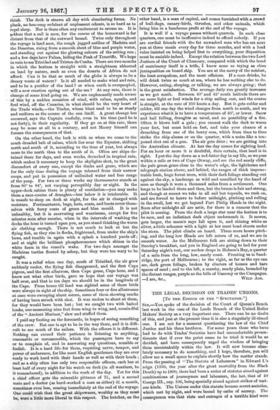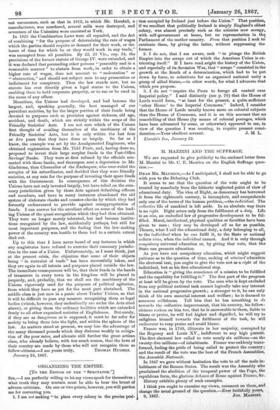THE LEGAL DECISION ON TRADES' UNIONS. [To THE EDTTOR OF
TUE " SPECTATOR."]
SIR,—You spoke of the decision of the Court of Queen's Bench last week in the case of the Leeds Branch of the United Boiler Makers' Society as a very important one. There can be no doubt of this, and just at the present time it is also a singularly ill-timed one. I am not for a moment questioning the law of the Chief Justice and his three brethren. For some years those who have had to do with Trades' Societies have had uncomfortable presen- timents that if ever the point came to be tried it would be so decided, and have consequently urged the wisdom of bringing them unmistakably within the law. It will now become abso- lutely necessary to do something, and I hope, therefore, you will allow me a small space to explain shortly how the matter stands. From the passing of " The Statute of Labourers " in Edward I.'s reign (1350, the year after the great mortality from the Black Death) up to 1800, there had been a series of statutes aimed against combinations of journeymen and labourers, the last, that of 40 George UT., cap. 106, being specially aimed against strikes of vari- ous kinds. The Unions under this statute became secret societies, which met by night, and were bound by oaths of secrecy. The consequence was that riots and outrages of a terrible kind were not uncommon, such as that in 1812, in which Mr. Horsfall, a manufacturer, was murdered, several mills were destroyed, and seventeen of the Unionists were executed at York.
In 1825 the Combination Laws were all repealed, and the Act of combining " for the purpose of determining the rate of wages which the parties should require or demand for their work, or the hours of time for which he or they would work in any trade," was exempted from all penalties. By 22, 23 Vic., cap. 34, the provisions of the former statute of George IV. were extended, and it was declared that persuading other persons peaceably and in a reasonable manner " to abstain from work, in order to obtain a higher rate of wages, does not amount to " molestation " or "obstruction," and should not subject men to any prosecution or indictment for conspiracy. Thus the law stands now, but no statute has ever directly given a legal status to the Unions, enabling them to hold corporate property, or to sue or be sued in the name of any officer.
Meantime, the Unions had developed, and had become the largest, and, speaking generally, the best managed of our provident societies, by far the larger portion of their funds being devoted to purposes such as provision against sickness, old age, accident, and death, which are strictly within the scope of the Friendly Societies' Acts. I am not sure which of the Unions first thought of availing themselves of the machinery of the Friendly Societies' Acts, but it is only within the last four or five years that they have done so largely. So far as I know, the example was set by the Amalgamated Engineers, who obtained registration from Mr. Tidd Pratt, and, having done so, proposed to invest their large surplus funds in the Post-Office Savings' Banks. They were at first refused by the officials con- nected with these banks, and thereupon sent a deputation to Mr. Gladstone, then Chancellor of the Exchequer, who over-ruled the scruples of his subordinates, and decided that they were friendly societies, at any rate for the purpose of investing their spare funds with the Government. In consequence of this decision the Unions have not only invested largely, but have relied on the sum- mary jurisdiction given by these Acts against defaulting officers and members, and have in many instances abandoned the old system of elaborate checks and counter-checks by which they had formerly endeavoured to provide against misappropriation of funds. I can answer for the excellent effect on some of the lead- ing Unions of the quasi-recognition which they had thus obtained. They were no longer merely tolerated, but had become institu- tions recognized by the law, accidentally perhaps, but still for moat important purposes, and the feeling that the law-making power of the country was hostile to them had to a certain extent died out.
Up to this time I have never beard of any instance in which any magistrates have refused to exercise their summary jurisdic- tion in the case of a Union. Unfortunately, as I must think, just at the present crisis, the objection that some of their objects being " in restraint of trade" has been successfully taken, and they are again to all intents and purposes placed outside the law. The immediate consequences will be, that their funds in the hands of treasurers in every town in the kingdom will be placed in jeopardy, and, probably, that we shall see the machinery of the Unions vigorously used for the purposes of political agitation, from which they have as yet for the most part abstained. The middle class is just now in a panic about Trades' Unions, so that it will be difficult to pass any measure recognizing them as legal bodies (which, however, they undoubtedly are under the Acts cited above), or giving them the ordinary facilities which are extended freely to all other organized societies of Englishmen. But surely, if they are as dangerous as is supposed, it must be far safer for society to bring them into the light, and within the sphere of the law. As matters stand at present, we may lose the advantage of the many thousand pounds which they disburse weekly in mitiga- tion of the poor rates, and alienate still further the great artizan class, who already believe, with too much reason, that the laws of their country are made by those who will not recognize them as
fellow-citizens.—I am yours truly, THOMAS HUGHES. January 24, 1867.































 Previous page
Previous page